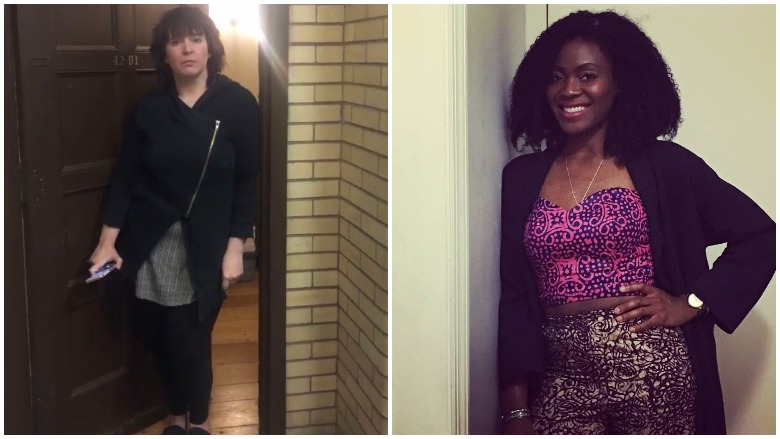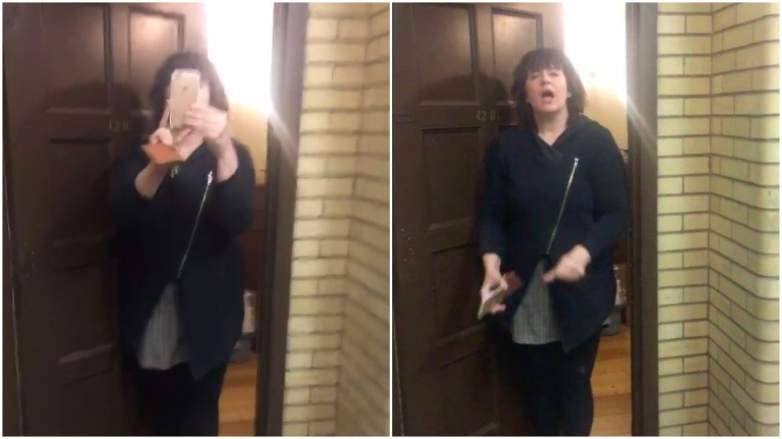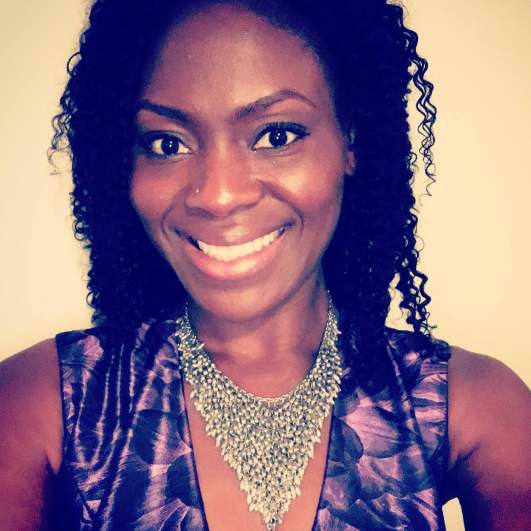
A black Yale University graduate student was taking a nap while studying for finals in a common room in her dorm when a white Ph.D student who also lives in the building woke her up and called the police on her. Lolade Siyonbola recorded her interaction with the other student, Sarah Braasch, along with the four responding police officers, and that video has gone viral after it was posted to Facebook.
It is the latest in a string of troubling incidents around the country of white people calling 911 on people of color for questionable reasons. Yale officials have said the incident is “deeply troubling,” and reaffirmed the university’s commitment to addressing incidents of “racial bias, discrimination and harassment.”
Braasch, a 43-year-old lawyer turned philosophy Ph.d student who has worked for women’s rights organizations and has posted about her views that hate speech laws are bad and burka bans are good, has not commented. You can read more about her here.
Here’s what you need to know about Lolade Siyonbola and the incident here:
1. Braasch Told Siyonbola It Was Her ‘Right’ to Call Police on Her, While Siyonbola Told Officers She Is ‘Not Going to Justify My Existence Here’

FacebookSarah Braasch.
The incident happened on Tuesday, May 8, at 1:40 a.m., Yale University Police Chief Ronnell Higgins said in a statement. A woman called police to say that she was a student and there was a woman sleeping in the common room on the 12th floor of the Hall of Graduate Studies. Higgins said the caller told police she didn’t know who the person was. Officers responded at 1:45 a.m. and met with the caller, who showed them her ID. She then let them up in the elevator and they stopped at the 5th floor, where the other student appeared.
“At this point, the caller pointed to the other student and said ‘This is her,'” Protocol is for police to separate the parties involved, so two officers stayed with the woman on the fifth floor and the investigating officer went with the caller to the 12th floor,” Higgins wrote. “The investigating officer spent over 11 minutes initially with the caller to assess the situation, while the other two officers spent about 15 minutes with the other woman to assess the situation and to confirm her identity. After reviewing the scene in the 12th floor common room and seeing a computer, books and notebooks in addition to a blanket and pillow on the couch, the investigating officer determined that the person who had been sleeping in the common room was likely a student, so the officer asked the caller to wait in her room on the 12th floor.”
In the first video posted by Lolade Siyonbola, 34, who is set to graduate with a master’s degree in African studies in 2019, shows Sarah Braasch standing in the doorway of her room with a phone in her hand. Braasch can be seen taking photos of Siyonbola and then she tells her, “I have every right to call the police you cannot sleep in that room,” before taking more photos. Siyonbola wrote, “Sarah Braasch, Philosophy PhD student, called the cops on my friend a few months ago for getting lost in my building. Today she messed—again—with the wrong one.” You can watch the video below:
In a second video, Siyonbola, who had been studying for finals, can be seen interacting with the Yale Police officers who responded to Braasch’s call. In the second video, she can be heard telling the officers, “I deserve to be here. I paid tuition like everybody else. I am not going to justify my existence here. I am not going to be harassed.”
Siyonbola told the officers, “I was sleeping in the common room and [Braasch] comes in and turns the lights on and was like, ‘Why are you sleeping here? You’re not supposed to be sleeping here. I’m going to call the police.'” The officers requested her ID and eventually confirmed it after she reluctantly gave it to them. She also showed them that she had a key to open her apartment. “I really don’t know if there’s a justification for you even actually being in the building,” Siyonbola said in the video.
Higgins, the Yale Police chief, wrote, “The investigating officer reported what she found to the other two officers on the fifth floor and a supervisor who had arrived to assess the situation and determine whether assistance was needed. The officers were having a difficult time confirming the other student’s identification due to the use of a preferred name in the system that was different from the official name on the ID. The supervisor worked with dispatch and security to clear up the matter, taking down the student’s information and giving her a case number. The assessment of the ID took about 15 minutes, which is longer than usual.”
According to social media profiles, Siyonbola’s full name is Ololade Siyonbola, but she goes by Lolade Siyonbola.
You can watch the video below:
Higgins wrote that after the ID issue was cleared up, “the investigating officer, with her supervisor, went to the 12th floor where they spoke to the caller again for another 7 minutes. Another officer also followed. They informed the caller that the student who had been in the common room was an authorized resident and had every right to be there. They also explained that this was not a police matter and were reporting the incident to the dean of the Graduate School of Arts and Sciences. Officers left HGS Studies at about 2:34 a.m.”
Yale’s Vice President for Student Life, Kimberly M. Goff-Crews said in a statement. ” I am deeply troubled by an incident that took place Monday night in the Hall of Graduate Studies. One graduate student called the police to report another student in the common area, who had every right to be there. The Yale police officers who responded spoke with both parties and subsequently admonished the complaining student that the other student had every right to be present.”
Siyonbola told the Yale Daily News that the May 8 incident wasn’t her first run-in with Braasch. In February she invited a group of graduate students to her dorm for a meeting in the common room. Jean-Louis Reneson, a black grad student, told the Daily News that he got lost in the building when he arrived and was “physically blocked” from entering the common room by Braasch after he asked her for directions. Reneson and Siyonbola filed a complaint about that incident with Yale’s Associate Dean for Graduate Student Development and Diversity Michelle Nearon. The Daily News obtained a copy of that complaint.
Reneson said Braasch did not appear to think he was a Yale student and accused him of being an intruder. “Feeling ignored, I went down to the base of the twelfth floor and eleventh floor and turned my back, but she continued to verbally assault me from the twelfth floor claiming that I ‘didn’t belong here’ and I was making her ‘uncomfortable,’” Reneson told the newspaper. He said Braasch left and Reneson went to the meeting, but four officers soon showed up to investigate a “suspicious character.” They quickly established Reneson was a student invited to the building by Siyonbola and left, the newspaper reports.
“[Cooley] just finally sent me an email to discuss it,” Reneson told the Daily News. “It’s her job to know these things, but now it’s damage control.”
In their complaint, Reneson and Siyonbola said that calling police on Reneson, and other “acts of micro-aggression and psychological violence,” at Yale leave many black gradaute and professional students feeling unsafe.
2. Siyonbola, Who Used to Work in Tech, Is Pursuing Her Master’s in African Studies

Lolade Siyonbola.
Lolade Siyonbola, 34, is pursuing her master’s degree in African Studies at Yale and is scheduled to graduate in 2019, according to the university’s website. She previously graduated from the University of Missouri with a degree in computer science and a minor in Spanish. After college, she worked in the technology field in New York City before going back to school at Yale.
“At Yale, her research focuses on the relationship between migration on identity formation, particularly among millennial first-generation Americans, and the role that cultural devices like language, film and textiles play in the preservation of culture. Lolade is a Foreign Language and Area Studies Fellow,” the Yale website states.
According to her website, “Lolade is passionate about the ways technology can be used to preserve and yet innovate on ancient cultures and traditions. She obsesses over traditional textiles, artistic indigenous films and bridging gaps across the Black Diaspora.”
Siyonbola was born in Nigeria and moved to the United States with her family as a child, after spending some time in the UK.
“It was tough because I didn’t fit in. I had a thick accent when I came to the United States. I had lived in London for a few years after I came from Nigeria and was very uppity. The kids just had their way and they just picked on me to no end,” she told Parle Magazine in 2013. “Because my parents were immigrants they weren’t present enough to say “this is how you deal with getting picked on.” They were struggling to get us into good schools and buy a house, so they weren’t present in a way that an American parent would have been and that was very tough. I always loved Nigeria and finding out that we weren’t going back was the shock of my young life.
3. She Founded the Yoruba Cultural Institute & the Nollywood Diaspora Film Series & Worked as the Editor of Applause Africa Magazine
According to the Yale website, Siyonbola founded the Yoruba Cultural Institute and the Nollywood Diaspora Film Series. She was also the editor of Applause Africa magazine.
“The Yoruba Cultural Institute was founded in 2008 to fill the void felt by Nigerian millenials who wish to speak the language of their parents and communities. There are hundreds of thousands of Nigerians in the US. Most of those under 35 can not speak their native language, whether it be Yoruba, Igbo or the host of other languages out of Nigeria,” the organization’s website states. “We understand that language is the glue that holds a people together, strengthens their collective identity and shapes the way that they view the world. It is also where the culture is preserved. Through music, art and performance, Yoruba has become arguably the most visible African culture worldwide. From WizKid to Wole Soyinka to David Oyelowo, we are celebrated everywhere.”
She told Parle magazine in 2013, “I have a sense of purpose. I’m very clear about why God put me here on Earth. I do, I feel very obligated to my people. To open our eyes to help us to look in the mirror and love what we see and to help us to look at each other and love what we see. I think that self-hatred is what is killing a lot of us in so many different dimensions. So I have an obligation to share that story of love and power. It’s a universal story also. It’s a blessing to black people but I think that all people need to find a way to love themselves fully.”
4. She Wrote a Book, ‘Market of Dreams,’ in 2012 & Has Performed as a Spoken Word Artist, Including Under the Name ‘Imperial Mandela Rose’
Siyonbola published her first book, “Market of Dreams,” a book of poems based on her stories, experiences and things she has learned in life, according to Parle. She told the magazine in 2013:
I’m a deep thinker and I’ve experienced a lot more than the average 29 year old. Whether it is love, heartbreak, tragedy or enlightenment, I try to impart everything that I’ve experienced. I think in doing so the point is to send the message of loving yourself and loving your neighbor. People always say to me that they’re inspired by the words of the book. They’re motivated. They’re so proud to be Black. Primarily I want people to look within and to see the beauty and the power that they have. The Market of Dreams is life. Life is a market of dreams. We choose to be happy or to be sad. We choose the friends that we want. We choose our situations to a large extent. We have a lot more control over our circumstance than we give ourselves credit for. It’s about taking control and taking charge of that inner power. It’s about using that power wisely to be a blessing and to be powerful while we’re here, doing what we are put here to do, to fulfill our purpose and to find true infinite joy within. So I hope people are inspired and that they walk away with a sense of empowerment more than anything else.
Siyonbola is also a spoken word artist and has performed both under her name and as “Imperial Mandela Rose.” You can watch videos of her performances below:
5. Siyonbola Said She Is ‘Grateful for All the Love, Kind Words & Prayers,’ but Has Expressed Frustration With Yale’s Response
https://www.instagram.com/p/BZrN8dMgNLm/?taken-by=loladeskentele
On Facebook, Siyonbola wrote, “Grateful for all the love, kind words and prayers, your support has been overwhelming ?? Black Yale community is beyond incredible and is taking good care of me. I know this incident is a drop in the bucket of trauma Black folk have endured since Day 1 America, and you all have stories.”
Yale Graduate School Dean Lynn Cooley said in an email to students on Wednesday, “Incidents like that of last night remind us of the continued work needed to make Yale a truly inclusive place. I am committed to redoubling our efforts to build a supportive community in which all graduate students are empowered in their intellectual pursuits and professional goals within a welcoming environment. An essential part of that effort must be a commitment to mutual respect and an open dialog.”
Goff-Crews said in her message to graduate students that she will be holding listening sessions along with Yale’s police chief and Cooley:
As Vice President for Student Life, I have worked with administrators, faculty and students to strengthen the resources available to address incidents of racial bias, discrimination, and harassment. This incident and others recently reported to me underscore that we have work to do to make Yale not only excellent but also inclusive. I strongly believe we must strive to create an environment that values equity and justice and in which all students are empowered to pursue their personal and professional goals — environment that is diverse, intellectually challenging, and broadly welcoming. Over the last 48 hours, I have been in discussion with Dean Lynn Cooley, Chief Ronnell Higgins, and other university staff, including Yale police, to better understand what exactly happened at HGS on Monday night, and how we can work together to avoid such incidents in the future.
We still have so much more to do.
Siyonbola told the Yale Daily News, “The response from Dean Cooley has been terrible. I don’t remember receiving any sort of apology or anything from her the first time, and this time the email that she sent was very vague, just not decisive, it just wasn’t direct with what the actual issues are. Do you want black students at Yale or do you not want black students at Yale? If you do, then be very clear about taking decisive action so incidents do not continue to happen. We don’t want to wait for a fatality … before actual action is taken on this.”



